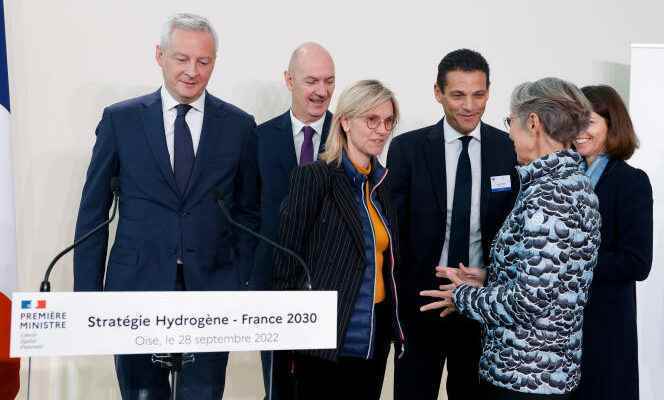En large device, Prime Minister Elisabeth Borne traveled to the Oise to say all the good things she thinks of hydrogen. Flanked by four ministers, she took advantage of the inauguration by Plastic Omnium of a hydrogen tank manufacturing plant to unveil the first ten French projects authorized by Brussels to receive subsidies in this area. The State is going to invest 2.1 billion euros, which will come on top of 3.2 billion in private investment which will make it possible to bring ten factories out of the ground to produce the elements of the hydrogen chain: electrolyzers to extract gas from water, reservoirs to store it and fuel cells to transform these molecules back into electricity.
First beneficial effect, the promised employment of 5,200 people. But the ambition goes much further, since the government intends to invest a total of 9 billion euros by 2030. The promise of hydrogen is immense, it is both that of a clean gas replacing its fossil equivalents to propel planes and power blast furnaces, and that of the storage and transport of electricity, in particular that produced by wind and solar power and thus freeing them from the curse of intermittency.
Decimated industry
But there is another promise, an old French moon, which is to create from scratch an industrial sector capable of employing nearly 100,000 people in high-tech trades. And in this area, the road will be long. Firstly, because the technology for producing hydrogen from water requires a lot of electricity. It will therefore be necessary to multiply electrical, renewable or nuclear infrastructures, whereas we lack them today. The other pitfall is that of the rise in industrial power and the reduction in costs which will have to result from it. Because if the objective is to decarbonize our economy, the French sector will have to be competitive, otherwise users, pressed by regulatory constraints, will look elsewhere.
And the specter of the disaster of the industrial solar photovoltaic sector in Europe reappears, decimated in less than a decade at the turn of the 2010s by the Chinese industrial machine, its subsidies and its massive effects of scale. With this Cornelian dilemma: slowing down competition by barriers to protect a national sector penalizes the penetration of technology and in this case that linked to the fight against global warming. It will therefore be necessary to combine relevance, consistency and performance. In short, the secret of a good industrial policy.
